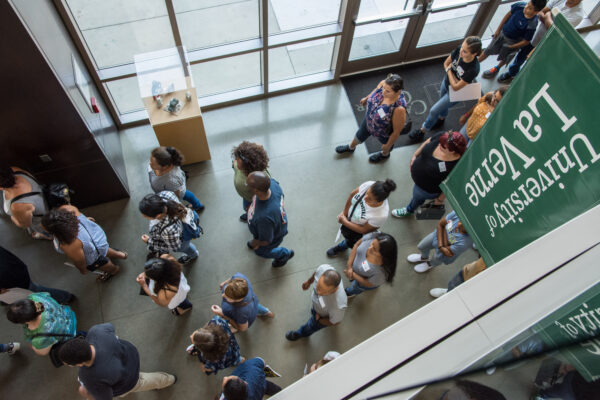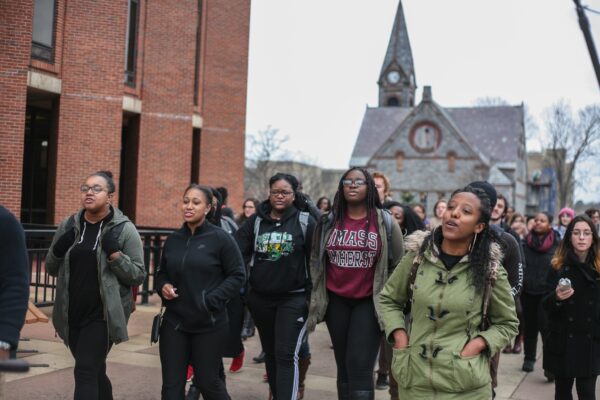By Jerry Lucido, Julie Posselt, and Maria Claudia Soler
ACE partnered with researchers from the University of Southern California Rossier School of Education to field a national survey of college and university presidents in March to better understand their viewpoints on college admissions and public trust in higher education, including their thoughts on the Operation Varsity Blues scandal. We received responses from 246 college and university presidents, the majority of whom lead four-year institutions.[1] It is important to note that presidents were asked to share their thoughts not only about issues facing their own institutions, but also issues facing higher education broadly. This blog post discusses the survey results and some equity-focused strategies the lead researchers believe might strengthen the admissions process and increase public trust in higher education.
It is said that times of crisis define leadership. A global pandemic and the murders of George Floyd, Breonna Taylor, and so many others, along with the subsequent Black Lives Matter protests for racial justice, are now testing higher education leaders unlike anything in recent memory. In March, as the pandemic began unfolding in the U.S. and colleges were quickly shifting to online and distance learning, we fielded our Pulse Point Survey on Public Trust and College Admissions. The results reveal important insights that have bearing on either losing or gaining public trust in times of crisis.
One prominent conclusion from the survey is that presidents believe increasing public trust in higher education is a critical issue for their presidencies and their leadership teams. Presidents also believe that the college admission process in general, and recent scandals in particular, have eroded the very public trust they seek to engender.
The survey was motivated by a desire to understand responses to a scandal in which Rick Singer, a private consultant, exploited weaknesses in the admissions system through falsifying candidate credentials and bribing athletic coaches, administrators, and others. The scandal was dubbed Operation Varsity Blues, and public concern about fairness and equity in admissions soon dominated the national conversation. While separate matters, Operation Varsity Blues, COVID-19, and Black Lives Matter each have revealed the advantages that wealth and privilege can buy Americans within major social institutions. It will take resolve on the part of leaders and institutions to rebuild trust in higher education, health care, and policing alike.
College presidents are well aware of the need to rebuild trust. Pulse Point Survey data revealed that 86 percent of the presidents indicated they either “strongly agreed” or “somewhat agreed” that increasing public trust is critical for their leadership team. Similarly, 87 percent of the presidents “strongly agreed” or “somewhat agreed” that increasing public trust is critical for their presidency (see Figure 1). Moreover, 71 percent of the presidents indicated that they “strongly agreed” or “somewhat agreed” with the statement “the college admissions process contributes to public mistrust in higher education,” and 93 percent indicated that Operation Varsity Blues served to increase mistrust in higher education (see Figure 2).
A year out from the scandal, 67 percent of the presidents “strongly agreed” or “somewhat agreed” that they are concerned about unfair external influences that give an advantage to certain students in the admissions process (see Figure 3). However, only 6 percent of the presidents “strongly agreed” or “somewhat agreed” that their institution has been negatively impacted by Operation Varsity Blues (see Figure 4).
When asked if they had discussed or made changes to any admissions policies or processes in light of this scandal, 15 percent indicated “yes” (see Figure 5). Among those who said “yes,” 60 percent were presidents from highly selective institutions, 24 percent were presidents from moderately selective institutions, 13 percent were presidents from less selective institutions, and 5 percent were presidents from open-access institutions.[2] These results suggest a greater level of response among highly selective institutions, an unsurprising finding given that many of the institutions impacted by the Operation Varsity Blues scandal were highly selective. Of those who reported having made changes to any admissions policies or processes in light of the scandal, 57 percent reported having reviewed processes regarding admissions of student athletes, 54 percent reported engaging with the board of trustees on issues related to the integrity of the admissions process, and 53 percent indicated that they had documented the admissions process and shared it with all parties who are part of the admitting students (see Figure 6).
Moving beyond focusing just on their own institutions, presidents were asked to select admissions-related areas that higher education leaders and other stakeholders more broadly should consider when discussing potential reforms to the college admissions process.
From a list of nine areas, 63 percent of all presidents selected athletic admissions, 62 percent selected alumni/legacy admissions, and 57 percent selected standardized testing (see Figure 7). When the data were again broken down by admission selectivity, the greatest variations by selectivity were found in athletic admissions and merit (versus need-based) scholarships (see Figure 8). While across all selectivity levels, more than half of presidents felt athletic admissions is an area to consider for reform, presidents of highly selective institutions (80 percent) were the most likely to select it, followed by presidents of open-admissions institutions (68 percent), moderately selective institutions (66 percent), and less selective institutions (59 percent). Presidents of less selective institutions (59 percent) were the most likely to select merit (versus need-based) scholarships as an area to consider, followed by presidents of highly selective (50 percent), moderately selective (47 percent), and open access institutions (38 percent).
It is useful to consider Operation Varsity Blues, COVID-19, and Black Lives Matter together when considering the dissonance evident in survey responses. As we noted, the survey responses reveal that nurturing public trust is a high priority (87 percent), alongside the belief that admissions (71 percent) and Operation Varsity Blues (93 percent) contributed to public mistrust. However, when asked if Operation Varsity Blues has had a direct impact on their campuses, few presidents “strongly agreed” or “somewhat agreed” (6 percent). The lesson of Operation Varsity Blues lies more in what it means to the public in terms of opportunity and equity than it does in terms of criminal activity at a specific institution. This impacts all campuses. And as with COVID-19 and Black Lives Matter, specific actions and remedies are needed.
These remedies may include some or all of the following:
- Develop, use, and study admission criteria that broaden the definition of merit. Inclusion comes from seeing equity and excellence as interrelated—you cannot have one without the other.
- Make every admission space available to all without privilege (and in the light of day when they are not.) Transparency will help restore trust.
- Highly selective and selective campuses should consider the impact of early decision and early action admission plans on low-income and minoritized populations, and review these programs to ensure they are inclusive and equitable. To compete on equal footing, these populations need the benefit of time and access to information.
- The balance of merit aid and other forms of tuition discounting should favor need-based aid rather than merit/non-need-based aid. Data from the U.S. Department of Education (2019) show that during the academic year 2015–16, the average merit-based institutional aid award was $1,500 greater than the average need-based institutional aid.
The most basic definition of trust is putting your welfare in someone else’s hands. And to prove yourself trustworthy, you must demonstrate care for someone’s or some group’s dignity, needs, or interests. This past year has revealed that colleges and universities often find themselves balancing multiple interests, and too often, those of low-income and racially minoritized populations—who have been disproportionately impacted by the pandemic—are not always well protected.
The Operation Varsity Blues scandal may have compromised public trust in a fair admissions process for elite universities, but 2020 has also revealed how institutions struggle to earn and keep historically marginalized students’ trust in times of more widespread crisis. In addition to taking action during a scandal, a sustainable strategy for rebuilding trust is deliberately demonstrating one day and one decision at a time that when times are hard, fairness and equity will not fall by the wayside.
*Notes
1 Of the 246 college and university presidents who responded to this survey, 58 percent lead private four-year institutions, 28 percent lead public four-year institutions, and 14 percent lead two-year institutions.
2 In terms of selectivity, 4 percent lead highly selective institutions (less than 25 percent of the applicants are admitted), 27 percent lead moderately selective institutions (between 26 and less than 60 percent of the applicants are admitted), 45 percent lead less selective institutions (60 percent of the applicants or more are admitted) and 24 percent lead open-access institutions. Where applicable, figure percentages might not total 100 due to rounding.
Reference
U.S. Department of Education. Institute of Education Sciences, National Center for Education Statistics. 2019. Trends in undergraduate non-federal grant and scholarship aid by demographic and enrollment characteristics: Selected years, 2003-04 to 2015-16. https://nces.ed.gov/pubs2019/2019486.pdf.
If you have any questions or comments about this blog post, please contact us.



